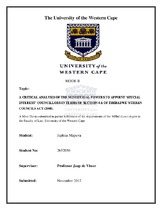A critical analysis of the ministerial powers to appoint 'special interest' councillors in terms of Section 4 A of Zimbabwe's Urban Councils Act (2008)
Abstract
Introduction: The appointment of special interest councillors in terms of section 4A of the Urban Councils Act has encountered much opposition from residents in many urban areas.8 The appointment has also attracted public attention, especially through the media which has highlighted the plight of urban councils most of which have failed to contend with additional unelected personnel on their payrolls. There has also been a claim that the process of appointing special interest councillors may be or that it is being abused.9 What has further exacerbated this situation is the fact that there is no legal provision to check the powers of the Minister, leaving room for the anipulation of the powers to appoint.10 Since the enactment of section 4A of the Urban
Councils Act (UCA) in April 2008, numerous elected councillors and mayors belonging to the MDC have been dismissed, or summarily suspended pending dismissal to justify the appointment of special interest councillors over and above elected councillors. At the same time the Minister seeks to discredit the Movement for Democratic Change (MDC) councillors as incompetent to gain political mileage for the Zimbabwe African National Union Patriotic Front
(ZANU PF).11 The rampant dismissal and suspension of MDC-T (the MDC faction led by Mr Morgan Tsvangirai) councillors and mayors and dissolving urban councils has led to allegations that the Minister seeks to weaken MDC in urban local councils and to justify the existence of special interest councillors in urban councils. By highlighting and examining the implications of these appointments on urban governance and the general functioning of urban local councils, the researcher will be able to assess the practice of appointing special interest councillors against internationally accepted norms.

